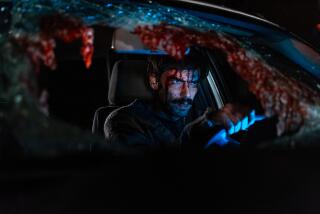Studios Cut Back Marketing of Violent Movies to Teens
- Share via
By all appearances, the new horror film “Wes Craven Presents Dracula 2000” is scary, sexy, gory and dark and comes with a hip heavy-metal soundtrack--just the ingredients that usually lure today’s teenagers to the local megaplex.
But in a move that was unthinkable a few months ago, the motion picture studio distributing the R-rated horror movie is doing everything it can think of not to promote it to America’s youth.
Only three months after Congress and the Federal Trade Commission took Hollywood to task for the way it has aggressively marketed violent R-rated films to underage youngsters, Dimension Films--a label within Miramax Films--is among the first studios to begin curbing those practices.
“Dracula 2000” has no official Web site, and its soundtrack has no music video. Trailers for the film are played only with R-rated and PG-13-rated films. The movie’s stars will not be permitted to appear on MTV’s popular afternoon show “Total Request Live,” which has a large underage viewership, and film footage is not being provided to the show. Likewise, the film’s stars are not giving interviews to popular teen magazines, such as “Teen People,” to promote the film.
“The feeling is, that was the responsible thing to do,” said Mark Gill, president of Miramax L.A., who oversees marketing at both Dimension and Miramax.
Gill said Dimension is abiding by an in-house policy that no R-rated films be advertised on TV programs or in any printed publications where more than 35% of the viewers or readers are under 18. An R rating means that a viewer under 17 must be accompanied by a parent or an adult guardian.
Marketing Strategies Face Scrutiny
In the coming year, Hollywood studios will come under intense public scrutiny for the way they market violent R-rated films. Already, several studios are testing the waters about how to carry out the new guidelines.
On Feb. 9, for example, MGM is scheduled to release “Hannibal,” the Ridley Scott-directed sequel to Jonathan Demme’s 1991 Oscar-winning film “The Silence of the Lambs.” The film has an R rating for “strong, gruesome violence, some nudity and language.”
Gerry Rich, president of worldwide marketing at MGM, said that because of the movie’s graphic nature, the studio won’t advertise on MTV before 9 p.m. and ads for the movie will not appear in magazines that are “skewed to young audiences.” There will be a “Hannibal” Web site. “There is really no way to get around it aside from being very cautious with the imagery you post on your site and using good judgment,” he said.
A similar story is unfolding at Warner Bros., which is set to release a new horror-thriller called “Valentine” in February starring Denise Richards. Rated R for strong horror violence, some sexual content and language, the film is set in San Francisco and centers on four women in their early 20s who are being stalked by a killer over Valentine’s Day weekend.
Brad Ball, president of domestic theatrical marketing at Warner Bros., said “Valentine” commercials, if they air at all on MTV, will be shown after 11 p.m., when an older audience is expected to be watching. He said the studio decided not to produce a music video of the soundtrack because it doesn’t make financial sense for a studio or record company to spend $300,000 to $500,000 on a music video if it isn’t going to be played on MTV throughout the day.
When Paramount Pictures released its R-rated dark comedy “Lucky Numbers” this fall, the studio decided not to put the movie’s star, John Travolta, on “Total Request Live” because it has a young audience.
Indeed, studios are so skittish these days that Universal Pictures recently bowed to complaints by a few theater chains and encouraged theater managers to remove the trailers for its PG-13-rated action-adventure sequel “The Mummy Returns” from theaters showing the PG-rated “Dr. Seuss’ How the Grinch Stole Christmas” because of fears the trailer might be too intense for young children.
Implementing Guidelines
The FTC report, issued last September, provided strong evidence that the movie, recording and electronic game industries have inappropriately marketed violent entertainment material to children and teenagers.
In film, for instance, the commission studied the marketing of 44 violent R-rated films and 20 violent PG-13 films distributed by nine major studios from 1995 to 1999 and found numerous instances when trailers approved for “all audiences” contained material that might draw criticism from parents.
One example cited by the commission was Dimension’s trailer for “Scream 2,” Craven’s 1997 sequel to his teen horror blockbuster, “Scream.” The trailer was approved for “all audiences,” the report stated, yet “contained a verbal reference to mutilation [that a woman had been stabbed seven times] and several visual depictions of violence against women [women being pursued by a masked, knife-wielding killer].”
Seeking to repair the public relations damage resulting from the report and an angry grilling by the Senate Commerce Committee, chaired by Sen. John McCain (R-Ariz.), the big studios and their industry lobbying arm, the Motion Picture Assn. of America, agreed to follow a 12-point program put forward by MPAA President Jack Valenti that included a pledge by the companies to “further the goal of not inappropriately specifically targeting children in its advertising of films rated R for violence.”
All of the major studios now have compliance officers or committees in place to oversee the marketing of R-rated films.
Not all studios follow the same guidelines. Warner Bros., 20th Century Fox, New Line Cinema, MGM and Miramax have decided not to run ads for R-rated films on any programs where 35% or more of the viewers are 17 and under. By comparison, Universal Pictures and Sony Pictures are making decisions on a film-by-film basis.
Ironically, the FTC did not recommend a 35% level for advertising on television, although the commission did use that figure when discussing the print media. Still, the 35% threshold is being used by many studios and was strictly followed by Dimension in the marketing of “Dracula 2000.”
Though Dimension would not allow the stars of the film to appear on “Total Request Live,” it did book two of the actors, Omar Epps and Jeri Ryan, on MTV’s morning talk show “Hot Zone,” which has a teen audience of 32%--just under the guidelines.
MTV has become a focus of worry for Hollywood studios because with its hip, young viewership, the cable music channel is able to attract large numbers of teenagers.
MTV officials said they were in full agreement with Dimension’s decision on “Dracula 2000.”
“While I have not seen the film, I suspect the violence level on it is not insignificant,” said John Shea, senior vice president of strategic programming at MTV. “I think we concur that [‘Total Request Live’] is not the best venue for that movie.”
Shea noted, however, that two-thirds of MTV’s overall viewership is over 18 and that there are other programs on the channel where it would be appropriate to promote an R-rated movie such as “Dracula 2000.” He said other R-rated films will be judged on a “case-by-case” basis.
Gill said that “Dracula 2000” is aimed at an 18-49 principal audience, not a teen audience, so it makes sense to avoid marketing to that segment of the population.
He said the movie is skewing older than the studio initially thought “because it’s Dracula and because there are so many people--men, in particular--who just like Dracula.”
Gill conceded that this is the kind of film that Dimension might have marketed to teenagers before the FTC report came out.
“In the past, it’s absolutely true that that’s something that probably would have been done,” Gill said. “Most companies did it. But it’s a new era out there, so there you go.”
That was not the case last summer, when Dimension bought commercial time on television for its sexually graphic R-rated summer spoof, “Scary Movie.” For that film, the studio ran commercials on such teen-oriented shows as “Malcolm in the Middle,” “Kids in the Hall” and the family-oriented films “Honey, I Shrunk the Kids” and “Adventures in Babysitting.”
Indeed, commercials for “Dracula 2000” will only appear on TV programs where more than two-thirds of the viewers are 18 and over. Gill gave such examples as “Dark Angel,” “Cops,” “Late Night with David Letterman,” “NFL on Fox,” “Saturday Night Live,” and “Stargate SG-1.” The studio will air commercials on the WB teen series, “Dawson’s Creek,” Gill added, only because that show does not meet the 35% threshold test.
Limiting Teen Access
Dimension declined an offer by Virgin Megastores to run promotions for “Dracula 2000” in the company’s record stores--such as running clips from the movie on in-store TV monitors. Dimension executives felt that there was no way to accurately gauge how many children see the displays while shopping in the stores. (In the movie, two of the characters work as salesgirls in a Virgin Megastore in New Orleans.)
“That was reason enough for us to say, ‘Let’s not,’ ” Gill said. “We would have loved to do it, but in this age of wanting to be more responsible about things, we felt that was enough.”
Sony Music recently released the movie soundtrack “Dracula 2000: Music from the Dimension Motion Picture,” which features heavy-metal songs by Disturbed, Slayer, Godhead featuring Marilyn Manson, (hed)p.e., Monster Magnet and Flybanger, but the album will not include a music video.
Will Sony face difficulty selling the album with so many restrictions being placed by Dimension on the promotions? Not really, say Sony executives.
Glen Brunman, head of Sony Music Soundtracks, said the record label has high hopes for the album and is prepared to spend money so that the soundtrack is prominently displayed in record stores, but it will not be marketed as a soundtrack of “Dracula 2000.”
Instead, Brunman said, “We will sell it as a great compilation for fans of hard rock and heavy metal.”
Dimension’s decision to avoid marketing the movie to teenagers was approved by Bob Weinstein, who oversees the Dimension label and co-chairs Miramax Films with his brother, Harvey.
Dimension is also trying to limit teen access to the film via the Internet. There is no official “Dracula 2000” Web site, although Web surfers will be able to find film clips at various Web sites that carry movie trailers, and a photo and synopsis appear on a Dimension “informational page.”
Rated R for “violence/gore, language and some sexuality,” the movie is a modern-day spinoff of the classic horror tale by author Bram Stoker. In the film directed by Patrick Lussier, Dracula--freed from his crypt--finds himself in a 21st century filled with chaos and temptation, Virgin Megastores and underground night spots, where he quickly seduces beautiful young women to become his sirens.
More to Read
The biggest entertainment stories
Get our big stories about Hollywood, film, television, music, arts, culture and more right in your inbox as soon as they publish.
You may occasionally receive promotional content from the Los Angeles Times.










